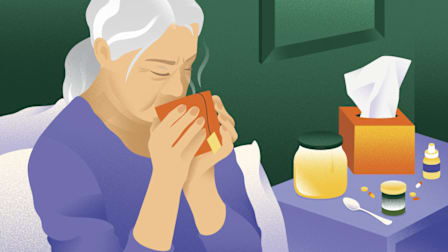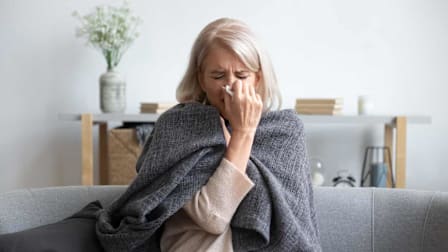3 Misconceptions About the Flu Shot and COVID-19
Is a flu shot really necessary this year? Experts say yes. Here are the facts.

Now that it’s October, getting a flu shot should be on the top of your to-do list, if you haven’t gotten one already. The Centers for Disease Control and Prevention recommends getting the vaccine by the end of October, in order to ensure that you’re protected against the flu before the season picks up steam.
Ideally, with very few exceptions, everyone over the age of 6 months would get a flu shot. And getting your shot is “more important this year than ever,” says Edward Belongia, MD, an infectious disease epidemiologist at the Marshfield Clinic Research Institute in Wisconsin. On top of flu season, SARS-CoV-2, the virus that causes COVID-19, will still be circulating in communities across the country.
You might be hesitating more than you normally would. In one recent survey, among people who said they did not plan to or were unsure about whether they would get a flu shot, about 1 in 6 said they were concerned about potentially being exposed to COVID-19 while getting vaccinated against the flu.
Here, three common misconceptions about this year’s flu shot and the pandemic, and the facts you really need to know.
Misconception: The Flu Shot Will Make You More Vulnerable to COVID-19
Reality: There’s no evidence that getting a flu shot will increase your susceptibility to COVID-19.
You might have heard about a study from the journal Vaccine, published online last year, that suggested that the flu shot might be linked to an increased risk of seasonal coronaviruses. Those are the kinds that cause some common colds.
But there are a number of reasons why this study, which looked only at data from the 2017-2018 flu season, shouldn’t put you off the flu shot. For one thing, Belongia says, “seasonal coronaviruses are very, very different from SARS-CoV-2.” So it’s not possible to draw conclusions about COVID-19 from data on seasonal coronavirus. And the link they did find may have been the result of some issues with the study’s methodology, Belongia says.
Misconception: Going Out to Get a Flu Shot Risks Exposing You to COVID-19
Reality: With many workplaces not offering flu shots and some people delaying checkups, it might take a little more planning than usual to get your flu shot. But it doesn’t have to be unsafe.
To guard against the spread of COVID-19, most healthcare centers are “implementing a tremendous amount of protective measures,” says Michael Phillips, MD, chief healthcare epidemiologist at NYU Langone Health. At NYU, for example, “We screen everybody before they come in to identify the people who are potentially ill.” On site, he says, anyone with symptoms is kept separate from people coming in who don’t have symptoms. On top of that, masks are required at all times for both staff and patients.
Nayak says that at the University of Rochester, “the mitigation measures are very strictly enforced, and you don't have people not following them.” Inside a hospital or clinic, where staff are trained in infection control, you shouldn’t encounter anyone without a mask, the way you might at a grocery store.
Call ahead to wherever you’re planning on getting your flu shot to find out what its procedures are for giving flu shots. Some clinics may be offering special hours for flu shots, or even drive-thru or outdoor vaccinations. If you’re headed to a pharmacy, check whether it offers appointments for flu shots so that you avoid any need to wait around. Your primary care provider may also give you an option to schedule a flu shot and be in and out quickly.




